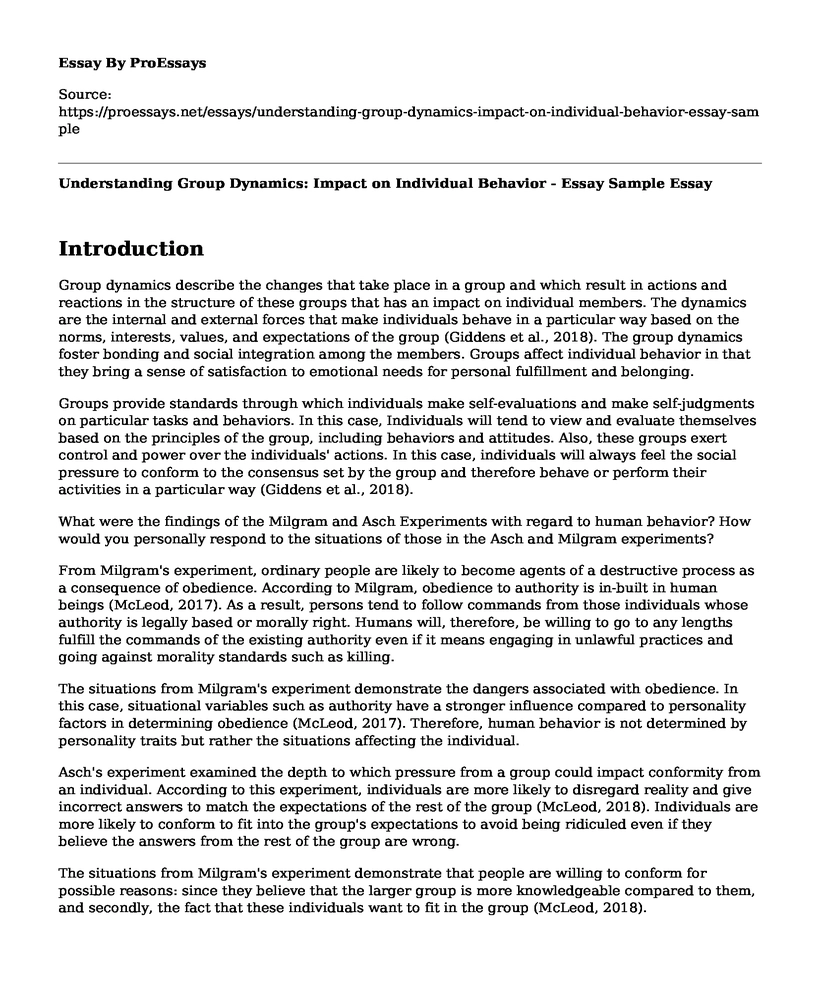Introduction
Group dynamics describe the changes that take place in a group and which result in actions and reactions in the structure of these groups that has an impact on individual members. The dynamics are the internal and external forces that make individuals behave in a particular way based on the norms, interests, values, and expectations of the group (Giddens et al., 2018). The group dynamics foster bonding and social integration among the members. Groups affect individual behavior in that they bring a sense of satisfaction to emotional needs for personal fulfillment and belonging.
Groups provide standards through which individuals make self-evaluations and make self-judgments on particular tasks and behaviors. In this case, Individuals will tend to view and evaluate themselves based on the principles of the group, including behaviors and attitudes. Also, these groups exert control and power over the individuals' actions. In this case, individuals will always feel the social pressure to conform to the consensus set by the group and therefore behave or perform their activities in a particular way (Giddens et al., 2018).
What were the findings of the Milgram and Asch Experiments with regard to human behavior? How would you personally respond to the situations of those in the Asch and Milgram experiments?
From Milgram's experiment, ordinary people are likely to become agents of a destructive process as a consequence of obedience. According to Milgram, obedience to authority is in-built in human beings (McLeod, 2017). As a result, persons tend to follow commands from those individuals whose authority is legally based or morally right. Humans will, therefore, be willing to go to any lengths fulfill the commands of the existing authority even if it means engaging in unlawful practices and going against morality standards such as killing.
The situations from Milgram's experiment demonstrate the dangers associated with obedience. In this case, situational variables such as authority have a stronger influence compared to personality factors in determining obedience (McLeod, 2017). Therefore, human behavior is not determined by personality traits but rather the situations affecting the individual.
Asch's experiment examined the depth to which pressure from a group could impact conformity from an individual. According to this experiment, individuals are more likely to disregard reality and give incorrect answers to match the expectations of the rest of the group (McLeod, 2018). Individuals are more likely to conform to fit into the group's expectations to avoid being ridiculed even if they believe the answers from the rest of the group are wrong.
The situations from Milgram's experiment demonstrate that people are willing to conform for possible reasons: since they believe that the larger group is more knowledgeable compared to them, and secondly, the fact that these individuals want to fit in the group (McLeod, 2018).
What would you do if the group pressured you to do harmful actions? Explain also how conformity could be positive and harmful. Discuss what your social and personal responsibility is in group behaviors.
I would resist the pressure from a group towards doing harmful actions. The decision to resist would be based on the need to stick to my moral standards and principles not to engage in illegal practices. In this case, conformity would be negative since I would not be obliged to the requests, and the consequences include not fitting in the group as well as standing the position to be ridiculed. On a positive side, my stand would prevent me from being caught on the wrong side of the law. My personal and social responsibility in the behaviors of a group is defined by the objectives and morality such that I would only involve myself towards a positive cause and which does not stand to do harmful actions.
References
McLeod, S. A. (2017). The Milgram experiment. Simply Psychology. Hyperlinked https://www.simplypsychology.org/milgram.html
McLeod, S. (2018, December 28). Asch conformity experiment. Simply Psychology. Retrieved from https://www.simplypsychology.org/asch-conformity.html
Giddens, A., Duneier, M., Appelbaum, R. P., & Carr, D. (2018). Introduction to Sociology, Seagull. WW Norton, Incorporated.
Cite this page
Understanding Group Dynamics: Impact on Individual Behavior - Essay Sample. (2023, May 19). Retrieved from https://proessays.net/essays/understanding-group-dynamics-impact-on-individual-behavior-essay-sample
If you are the original author of this essay and no longer wish to have it published on the ProEssays website, please click below to request its removal:
- Group Counseling Plan With Children and Adolescents Paper Example
- Paper Example on Paranoia and Network Collectivity
- Correction Systems Essay Example
- Essay Sample on Children With Attention Deficit Disorder
- Essay Sample on Coping with Anxiety: A Key to Overcoming Stress
- Tom's Saturday of Temptation and Deceit - Book Review
- Romantic Story: Rush - Free Paper Sample







